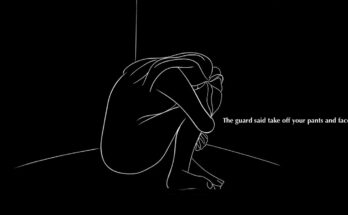By Lawdan Bazargan
Source: Iran International

The now-viral unveiled performance by singer Parastoo Ahmadi which landed her briefly in jail was not just an artistic endeavor, but a groundbreaking act of defiance of Iran’s new oppressive Hijab law and the theocratic apparatus of control.
The significance of the moment is hard to overstate: a young woman raising her voice in song in an open space just as greying men in closed rooms pass laws demanding women and girls like her live as they dictate or face punishment.
Politicians and philosophers in eras past clearly warned of the affront to society such brute measures represent.
Under Iran’s new hijab law, women and even teenage girls face heavy fines, travel bans, and ultimately imprisonment if they do not follow a strict, arbitrary dress code. A government that enacts such a law seeks to exert total control over its citizens. This is not a law about clothing; it is a tool for suppression of human dignity.
The scope of this law is unprecedented. Minors as young as nine years old can face fines or detention in juvenile facilities for noncompliance. Social media influencers, businesses, and even parents of offenders are held accountable, creating a web of fear and enforcement.
Surveillance measures extend to digital spaces, requiring platforms to remove noncompliant content or face punitive actions. The aim is to crush dissent and—perhaps more disturbingly—to correct any ideological deviation.
The law evokes George Orwell’s dystopian novel 1984, where surveillance extends not only to actions but also to thoughts and identities. The legislation seeks to enforce not just outward compliance but inward conformity, leaving no room for personal freedom or dissent.
Control is imposed by surveillance and punishment, targeting families, businesses, and entire communities. Women who choose to wear attire deemed inappropriate by the state risk being charged with “corruption on earth,” a charge that can carry the death penalty.
Businesses, from local shops to online platforms, are fined or shut down if they fail to report or enforce compliance among employees and customers.
This flies in the face of societal changes in Iran. Young Iranians appear to be convinced more than ever that individuals are the best judges of their own lives. Having grown up under the Islamic Republic, they seem to know by instinct what the English philosopher John Stuart Mill said in On Liberty: that their freedom to make personal decisions must be protected unless it directly harms others.
The Hijab law, however, does the opposite—it strips away personal choice under the guise of moral guardianship, violating a core tenet of human dignity.

Laws are meant to protect freedoms, safeguard dignity and promote societal justice. A law that fails to uphold justice, as Henry David Thoreau would say, is not a law at all, but a tool of oppression. The Hijab law is that exactly, violating the dignity and autonomy of individuals.
The social consequences of this law are equally alarming. Hannah Arendt, in The Origins of Totalitarianism, warned of the dangers of laws designed to pit citizens against one another.
By mandating surveillance and encouraging individuals to report alleged violations within their communities, the Hijab law fosters mistrust and undermines social cohesion. This dynamic creates a society where neighbors become informants, and fear replaces solidarity.
Despite these oppressive measures, citizens are not powerless. Thoreau believed that resistance to unjust laws is a moral imperative.
Silence in the face of injustice, he argued, equates to complicity. The Hijab law, which flagrantly violates fundamental freedoms, calls for collective opposition. Defending the right to freedom of dress and personal choice is not merely an act of defiance but a stand for justice and human dignity.
In a society where women are jailed or executed for the simplest acts of autonomy, Parastoo’s voice resonated as a symbol of resistance, courage, and the irrepressible human spirit. Accompanied by male bandmates who stood in solidarity rather than domination, they showcased the power of collective defiance against tyranny.
This act of rebellion was a vivid reminder that even within the confines of authoritarianism, the spirit of freedom can shine, emboldening others to challenge unjust laws and envision a future where justice and dignity prevail.
The question for us Iranians and the global community is clear: will we stand idly by, or will we follow Parastoo—and many before her— to confront this affront to freedom and justice?





